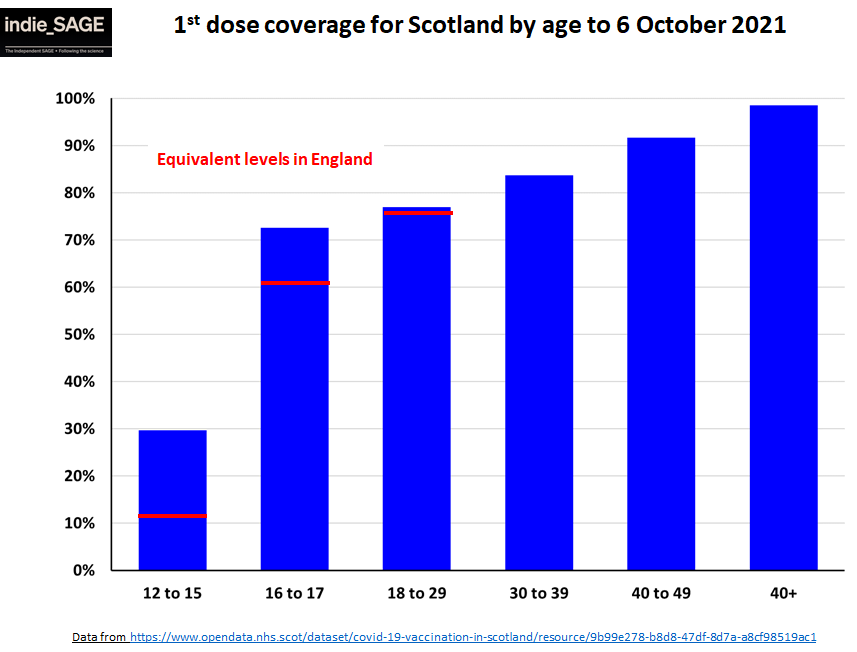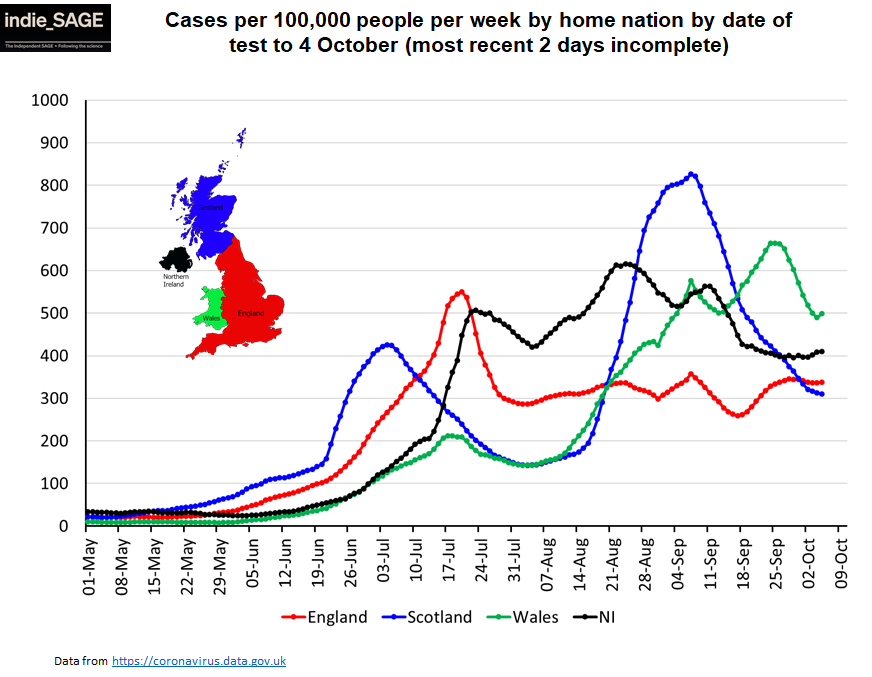Thread on Covid & UK (mainly England).
TLDR the two epidemics theme continues and the impact of summer infections on long covid is becoming evident... 1/13
TLDR the two epidemics theme continues and the impact of summer infections on long covid is becoming evident... 1/13
On vaccination, we've started on 12-15s but roll out is slower than it was for 16-17s... and in younger age groups we are substantially behind Scotland who have been using walk in clinics for teens.2/13 



For boosters, we've now given a quarter of 80+ their booster and rollout is progressing. When the programme started, 3.5m people were already elgibile for their booster - we've got a bit of work to catch up to all the eligibles as soon as we can! 3/13 



In terms of cases, UK has gone quite a bit last 2 days. Age, region etc are lagged by a few days (date of test) so I'm not sure why at the moment!
By nation for date of test (lagged), looks like cases flattening in all countries.
Positivity flattening in NI and England. 4/13


By nation for date of test (lagged), looks like cases flattening in all countries.
Positivity flattening in NI and England. 4/13



For hospitalisations, occupancy is declining in each nation (good).
For admissions, the persistent much higher admissions in the North & Midlands vs the South East continues. As we go into winter the NHS covid pressures are not being felt equally. 5/13

For admissions, the persistent much higher admissions in the North & Midlands vs the South East continues. As we go into winter the NHS covid pressures are not being felt equally. 5/13


Deaths have started going down now which is good news. This reflects the shift of cases into children who are at much lower risk of death.
Case rates have been declining/flat in 60+ for past few weeks and this is now leading to fewer deaths. 6/13
Case rates have been declining/flat in 60+ for past few weeks and this is now leading to fewer deaths. 6/13

Cases in children remain far higher than in adults. It looks as if cases might have peaked for now but they are still incredibly high - the most recent ONS infection survey (random testing) found *7%* of secondary school kids had Covid in week to 2nd Oct.
7/13

7/13


We are also seeing climbing hospital admissions in 6-17 year olds (but rates much much less than adults).
That said, children are in the eye of the pandemic still from their point of view. 8/13
That said, children are in the eye of the pandemic still from their point of view. 8/13

ONS released its latest long covid report of people self-reporting symptoms for longer than 4 weeks after getting Covid.
ons.gov.uk/peoplepopulati… 9/13
ons.gov.uk/peoplepopulati… 9/13
There has been a big jump in people reporting Long Covid who were infected over the summer (<8 weeks before 5 September).
This is the consequence of high cases over July & early August 10/13
This is the consequence of high cases over July & early August 10/13

Age group that has seen the biggest rise are 17-24 yr olds - the exact group that had the higest infections in July.
People working in hospitality also reported big increases - hospitality is high risk and people working their have little control over their environment. 11/13
People working in hospitality also reported big increases - hospitality is high risk and people working their have little control over their environment. 11/13

Unfortunately with continued high cases, we are likely to see more increases in people reporting Long Covid, and will be disproportionately in people exposed to infection. Risky workplaces are part of that.
That said, hopefully increasing vax rates will reduce long covid. 12/13
That said, hopefully increasing vax rates will reduce long covid. 12/13
Internationally, case and death rates are much lower in much of West & Northern Europe than in UK / England.
@martinmckee & I discuss possible reasons here
theguardian.com/commentisfree/… 13/13

@martinmckee & I discuss possible reasons here
theguardian.com/commentisfree/… 13/13


PS thanks as ever to Bob Hawkins for his help in collating data and preparing charts!
• • •
Missing some Tweet in this thread? You can try to
force a refresh























